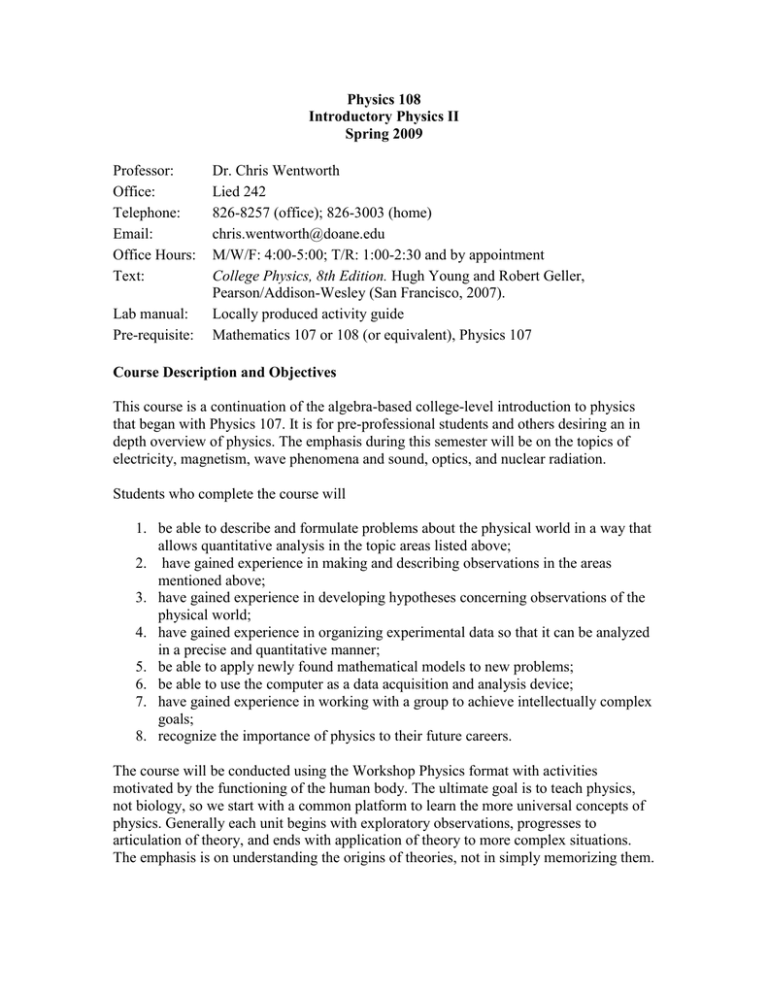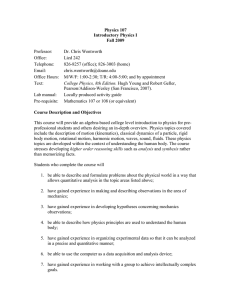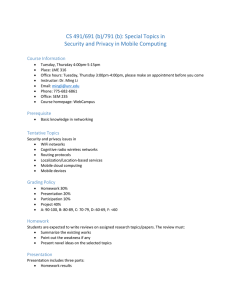
Physics 108
Introductory Physics II
Spring 2009
Professor:
Office:
Telephone:
Email:
Office Hours:
Text:
Lab manual:
Pre-requisite:
Dr. Chris Wentworth
Lied 242
826-8257 (office); 826-3003 (home)
chris.wentworth@doane.edu
M/W/F: 4:00-5:00; T/R: 1:00-2:30 and by appointment
College Physics, 8th Edition. Hugh Young and Robert Geller,
Pearson/Addison-Wesley (San Francisco, 2007).
Locally produced activity guide
Mathematics 107 or 108 (or equivalent), Physics 107
Course Description and Objectives
This course is a continuation of the algebra-based college-level introduction to physics
that began with Physics 107. It is for pre-professional students and others desiring an in
depth overview of physics. The emphasis during this semester will be on the topics of
electricity, magnetism, wave phenomena and sound, optics, and nuclear radiation.
Students who complete the course will
1. be able to describe and formulate problems about the physical world in a way that
allows quantitative analysis in the topic areas listed above;
2. have gained experience in making and describing observations in the areas
mentioned above;
3. have gained experience in developing hypotheses concerning observations of the
physical world;
4. have gained experience in organizing experimental data so that it can be analyzed
in a precise and quantitative manner;
5. be able to apply newly found mathematical models to new problems;
6. be able to use the computer as a data acquisition and analysis device;
7. have gained experience in working with a group to achieve intellectually complex
goals;
8. recognize the importance of physics to their future careers.
The course will be conducted using the Workshop Physics format with activities
motivated by the functioning of the human body. The ultimate goal is to teach physics,
not biology, so we start with a common platform to learn the more universal concepts of
physics. Generally each unit begins with exploratory observations, progresses to
articulation of theory, and ends with application of theory to more complex situations.
The emphasis is on understanding the origins of theories, not in simply memorizing them.
The use of direct experience, new computer tools, and active participation will enable
you to achieve an enriched set of learning goals. In addition to mastering a traditional
body of knowledge and learning how to solve physics problems, you should be able to
develop your reasoning ability, and your computer and laboratory skills to a much greater
extent than you would in more traditional introductory physics courses. In Introductory
Physics your powers of observation, reasoning ability and the depth of comprehension of
physical theories are considered to be far more important than any memorized facts or
theories.
Course Requirements
Participation/Group: Attending and participating in class will be particularly important
this semester. You will be making many observations of phenomena and discussing these
observations with your group, so your presence in body and mind is required.
Before coming to class you should complete any textbook or other readings, and/or
exercises and problems to be handed in. It is also a good idea to read the appropriate
sections of the activity guide for each class day.
During class sessions your willingness to discuss ideas with classmates, devise clever
ways to measure or observe things, articulate your methods, and make brief presentations
to your colleagues and the instructor are important aspects of your participation in the
course.
In-class written work will consist primarily of documenting your class activities by filling
in the requested entries in the guidebook entry spaces provided in this Activity Guide.
You are encouraged to keep your own notes as well.
You will need to work efficiently and responsibly with your group colleagues.
Activity Guide: These entries describe observations, derivations, calculations, and
answers to questions. Entries will be assessed for completeness, clarity, and honesty. We
are not merely looking for "right answers" as each observation represents a unique
experience. The activity guide entries represent a record of your developing thinking on
the topics encountered during the semester. There will be several unannounced Activity
Guide quizzes given throughout the semester.
Assigned Problems: These assignments are generally due at the beginning of each class
period. Late assignments will result in a penalty. There will be a variety of homework
problems assigned. We will use a web-based delivery system for much of the homework
assigned. You will be required to log on to the server and answer the questions. The
server will grade your answers and give you a score.
For homework problems assigned from other sources which require you to record your
answers on paper the following rules apply. The problem solutions should be written on
one side of the paper only. The back of the last page should have your name and
assignment number on it. In order to get full credit on a problem, the solution should
contain a diagram, brief description of the physical situation and calculations.
Homework problems generally will not be worked out during class unless there are
explicit requests. However, some example and review problems will be worked for you.
Exams: There will be three exams given during the semester. You will have a full class
period (100 minutes) to complete the exam.
Unless otherwise specified, exams will be closed-book, except that you will have a one
page equation sheet for use on the exam. You may use an electronic calculator. Cell
phones must be turned off during an exam.
Practice working problems and questions, as well as reviewing assigned readings and
written work is probably the best way to prepare for an examination. Each exam will
have conceptual questions, observational or data analysis questions, and problems. Rote
memorization of material will not enable you to score well on examinations.
Final: There will be a comprehensive final.
Course work will be weighted according to
the following percentages:
The following scale is used in
assigning grades:
Participation/Group
5
A+
97-
Homework Problems
20
A
91-96+
Activity Guide
20
A-
90-90+
Exams
40
B+
86-89+
Final
15
B
80-85+
B-
79-79+
C+
75-78+
C
67-74+
C-
65-66+
D+
60-64+
D
57-59+
D-
55-56+
Academic Integrity
In accordance with Doane's Academic Dishonesty Policy any act of dishonesty in
pursuing course work will be penalized. If it is a first act (no reported incidents in any
course) the penalty is an assignment of zero points for the particular piece of work
involved. Second and subsequent acts of dishonesty will be handled by the Vice President
for Academic Affairs. Each act of dishonesty will be reported to the Academic Affairs
office.
For this particular course acts of dishonesty include representing someone else's work as
your own on exams or homework.
Students With Disabilities
Students with disabilities substantially limiting a major life activity are eligible for
reasonable accommodations in college programs, including this course. Accommodations
provide equal opportunity to obtain the same level of achievement while maintaining the
standards of excellence of the college. If yo have a disability that may interfere with your
participation or performance in this course, please meet with the instructor to discuss
disability-related accommodations, and other special learning needs.
Note: This syllabus is subject to change




